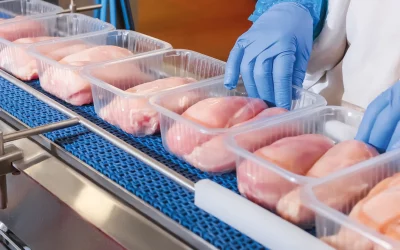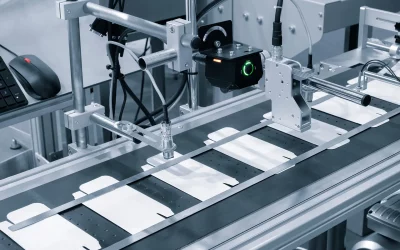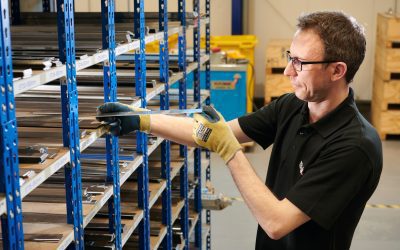The Significance of Vertical Packaging Knives
Vertical packaging knives play a crucial role in enhancing the packaging process, especially for delicate items such as snack foods, confectioneries, and pharmaceutical products in the food and beverage industries. These knives enable precise cutting, minimising waste and ensuring the quality of packaged products, ranging from crisps and chocolates to tablets and capsules. Integrated into VFFS machines, they contribute to the automation of the packaging process, resulting in increased efficiency and productivity.
One of the key advantages of using high-quality vertical packaging knives is their reliability. These knives are designed to withstand the demands of continuous production, reducing downtime and ensuring uninterrupted operation. Moreover, they contribute to cost savings by facilitating efficient cutting, reducing operating costs associated with waste and rework.
When choosing vertical packaging knives, several factors must be considered. Quality is of utmost importance, as low-quality knives can lead to manufacturing delays, equipment malfunctions, and quality issues with products. Hence, it is crucial to invest in high-quality knives made from durable materials like stainless steel, high-speed steel, carbide and ceramic is essential for smooth and efficient operations. Additionally, it is key to partner with a supplier such as MRMK that offers prompt delivery and excellent after-sales support, ensuring that replacement knives are readily available when needed.
Types of Vertical Packaging Knives
Vertical packaging knives come in various types, each designed to cater to specific packaging requirements such as container, coffee pod and label production. Understanding these different types allows packaging professionals to make informed decisions when selecting the most suitable knives for their operations.
Vertical Bagging Knives
Vertical bagging knives are versatile tools used for cutting packaging materials during the bagging process. These knives can be customised to fit different machines, enabling faster and sharper cutting. They are invaluable for scoring, slitting, perforating, and cutting materials with precision and speed. With customisable options and a choice between stainless steel or carbon steel, vertical bagging knives offer flexibility and reliability in various packaging applications.
Sleever Blades
A sleever blade, also known as a sleeving blade or label applicator blade, is used in the packaging industry for applying sleeves or labels onto products. These blades are part of sleeving machines or label applicators, which are commonly used for packaging bottles, containers, or other products.
The primary function of a sleever blade is to precisely cut and apply sleeves or labels to products as they move along a production line. These blades play a crucial role in ensuring that the sleeves or labels are accurately positioned and securely attached to the items, contributing to the overall efficiency and quality of the packaging process.
Flowrapper (HFFS)
A Flowrapper, or Horizontal Form-Fill-Seal (HFFS) machine, is an automated packaging system widely used in the food and non-food industries. This machine efficiently creates flexible packages by unwinding a roll of flat, flexible film, forming it into a horizontal pouch, depositing the product, and sealing the open end. Products like coffee pouches, chocolate sharing bags and baked goods all utilise Flowrapper machines as they are a popular choice for high-volume production.
Enhancing Efficiency with Vertical Packaging Knives
In addition to their primary role in the packaging process, vertical packaging knives can be monitored and optimised for further efficiency gains. Data loggers (smart sensors) enable real-time monitoring of machine status, cycles per minute (CPM), and downtime. This data allows packaging professionals to track performance, identify bottlenecks, and optimise production processes. By leveraging this data, manufacturers can make informed decisions, improve machine uptime, and streamline their packaging operations.
If you’re in need of high-quality vertical packaging knives for your business, talk to our expert team to discuss your unique requirements.
Get in touch with us today and experience the MRMK difference.
Explore MRMK’s custom blade solutions now
For more machine blade buying guides, advice and information, read the MRMK News and Insights Hub…
FAQs
What is the primary role of Vertical Packaging Knives in the packaging industry?
Vertical Packaging Knives are essential tools designed to enable precise cutting and sealing of various packaging materials such as bags of crisps, packaging labels and coffee pouches.
How do high-quality Vertical Packaging Knives contribute to operational efficiency?
High-quality knives, crafted from durable materials like stainless steel, high-speed steel, carbide, and ceramic, ensure reliability and longevity. This contributes to reduced downtime, uninterrupted operation, and cost savings associated with efficient cutting, minimising waste and rework.
What are the different types of Vertical Packaging Knives, and how do they cater to specific packaging requirements?
Vertical Packaging Knives come in various types, including vertical bagging, sleever and flowrapper blades.
Why is it crucial to choose the right supplier when investing in Vertical Packaging Knives?
Partnering with a reliable supplier, such as MRMK, ensures prompt delivery and excellent after-sales support. This ensures that replacement knives are readily available when needed, minimising downtime and maximising operational continuity.
Can Vertical Packaging Knives be customised to fit different packaging machines, and how does this customisation contribute to operational flexibility?
Vertical Packaging Knives can be customised to fit different packaging machines, enhancing operational flexibility. This customisation ensures precise alignment with the unique specifications of each machine, promoting compatibility and smooth operation. It extends beyond fit to include material and blade options, allowing businesses to choose the most suitable configurations for their specific packaging materials. The tailored design facilitates quick changeovers between different setups, enhancing agility in dynamic production environments.


 +44 (0) 1909 519815
+44 (0) 1909 519815 


